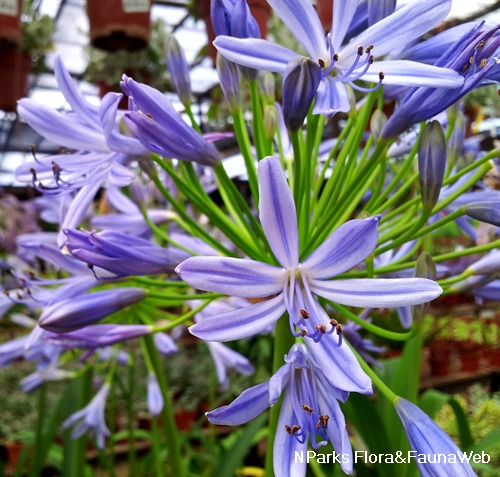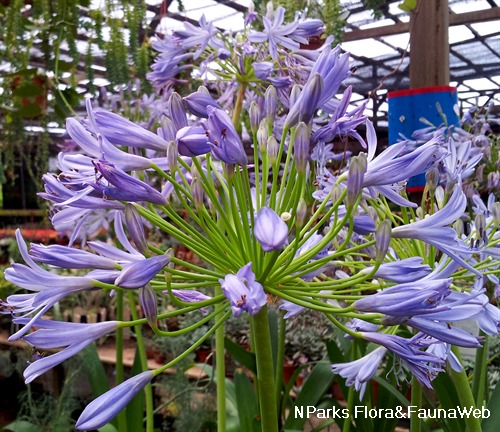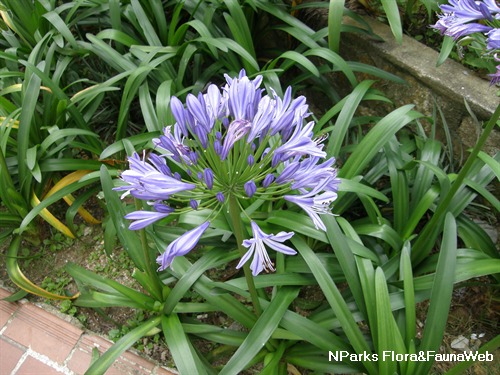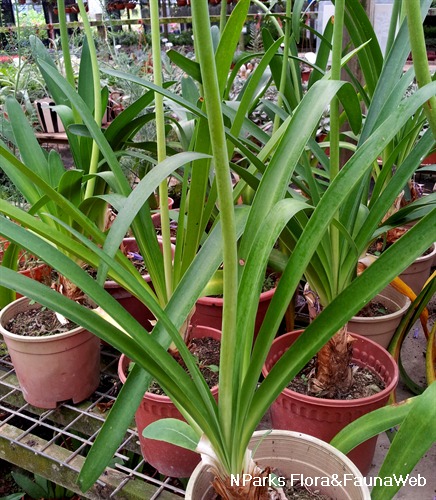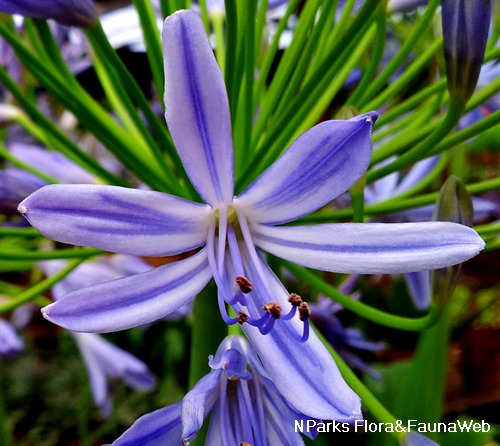
Back
Agapanthus praecox Willd.
| Family Name: | Amaryllidaceae |
| Common Name: | Lily of the Nile, African Lily, Common Agapanthus, 早花百子莲, 爱情花 |
Name
Classifications and Characteristics
| Plant Division | Angiosperms (Flowering Seed Plants) (Monocotyledon) |
|---|---|
| Plant Growth Form | Herbaceous Plant |
| Lifespan (in Singapore) | Perennial |
| Mode of Nutrition | Autotrophic |
| Maximum Height | 0.8 m to 1 m |
Biogeography
| Native Distribution | South Africa |
|---|---|
| Native Habitat | Terrestrial |
| Preferred Climate Zone | Tropical, Sub-Tropical / Monsoonal |
Description and Ethnobotany
| Growth Form | Rhizomatous herb up to 1 m tall. |
|---|---|
| Foliage | Each plant has 6-20 linear leaves which vary widely in width and length. They may have blunt or pointed tips. |
| Stems | Plants have an underground horizontal stem known as a rhizome. |
| Flowers | Purple, trumpet-shaped flowers are long and tubular with 6 oval to elongated, well-separated lobes. They are arranged in a ball-shaped cluster known as an umbellate inflorescence. |
| Cultivation | This low maintenance plant tolerates nutrient poor soil well, but grows best when planted in compost rich, well-drained soils. Division every 4 years helps to maintain flowering. |
| Etymology | The genus Agapanthus is derived from the Greek words for love and flower (agape and anthos, respectively). |
| Ethnobotanical Uses | Medicinal: According to the folk medicine of African tribal peoples, the plant can be taken to promote healthy pregnancy and facilitate childbirth. It is also thought to treat coughs, colds, heart disease and chest pains. |
Landscaping Features
| Desirable Plant Features | Ornamental Flowers |
|---|---|
| Landscape Uses | General, Parks & Gardens, Flowerbed / Border, Container Planting |
| Usage Hazard - Cons | Toxic Upon Ingestion |
Plant Care and Propagation
| Light Preference | Full Sun |
|---|---|
| Water Preference | Moderate Water |
| Plant Growth Rate | Fast |
| Rootzone Tolerance | Moist Soils, Well-Drained Soils, Poor Infertile Soils, Fertile Loamy Soils |
| Propagation Method | Seed, Division |
Foliar
| Foliage Retention | Evergreen |
|---|---|
| Mature Foliage Colour(s) | Green - Bluish Green |
| Mature Foliage Texture(s) | Smooth |
| Foliar Type | Simple / Unifoliate |
| Foliar Attachment to Stem | Sessile |
| Foliar Shape(s) | Non-Palm Foliage (Linear) |
| Foliar Venation | Parallel |
| Foliar Margin | Entire |
Floral (Angiosperm)
| Flower & Plant Sexuality | Bisexual Flowers |
| Flower Colour(s) | Blue, White |
|---|---|
| Flower Grouping | Cluster / Inflorescence |
| Flower Location | Terminal |
| Flower Symmetry | Radial |
| Individual Flower Shape | Trumpet-shaped, Tubular |
| Inflorescence Type | Umbel |
Image Repository
Others
| Master ID | 29194 |
|---|---|
| Species ID | 3503 |
| Flora Disclaimer | The information in this website has been compiled from reliable sources, such as reference works on medicinal plants. It is not a substitute for medical advice or treatment and NParks does not purport to provide any medical advice. Readers should always consult his/her physician before using or consuming a plant for medicinal purposes. |

